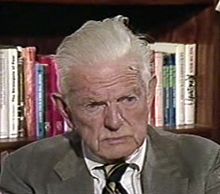Difference between revisions of "Norman Dodd"
(Created page with "{{person |WP=https://en.wikipedia.org/wiki/Norman_Dodd |birth_date=June 29, 1899 |death_date=January 1, 1987 |image=Norman Dodd.jpg }} ==Career== Norman Dodd had an his unusua...") |
|||
| Line 6: | Line 6: | ||
}} | }} | ||
==Career== | ==Career== | ||
| − | Norman Dodd had an his unusual career, which started in banking, until after investigating the circumstances surrounding the great financial crash of 1929, he reported to his bank's directors that banking would never be stable until the money system was radically reformed. Offered something of a sinecure for his silent acquiescence, he resigned only to discover that no US banks would employ him. He is remembered for his controversial report to the [[1953 Reece Committee on Foundations]], he began with a definition of "subversive", saying that the term referred to "Any action having as its purpose the alteration of either the principle or the form of the United States Government by other than constitutional means." He then proceeded to show that this applied to the [[Ford Foundation]], [[Rockefeller Foundation]], and [[Carnegie Endowment]]. | + | Norman Dodd had an his unusual career, which started in banking, until after investigating the circumstances surrounding the great financial crash of 1929, he reported to his bank's directors that banking would never be stable until the money system was radically reformed. Offered something of a sinecure for his silent acquiescence, he resigned only to discover that no US banks would employ him. He is remembered for his controversial report to the [[1953 Reece Committee on Foundations]], he began with a definition of "subversive", saying that the term referred to "Any action having as its purpose the alteration of either the principle or the form of the United States Government by other than constitutional means." He then proceeded to show that this applied to the [[Ford Foundation]], [[Rockefeller Foundation]], and [[Carnegie Endowment]].<ref>http://www.unwelcomeguests.net/Norman_Dodd</ref> |
{{SMWDocs}} | {{SMWDocs}} | ||
==References== | ==References== | ||
{{reflist}} | {{reflist}} | ||
{{Stub}} | {{Stub}} | ||
Revision as of 13:50, 2 July 2016
 | |
| Born | June 29, 1899 |
| Died | January 1, 1987 (Age 87) |
Career
Norman Dodd had an his unusual career, which started in banking, until after investigating the circumstances surrounding the great financial crash of 1929, he reported to his bank's directors that banking would never be stable until the money system was radically reformed. Offered something of a sinecure for his silent acquiescence, he resigned only to discover that no US banks would employ him. He is remembered for his controversial report to the 1953 Reece Committee on Foundations, he began with a definition of "subversive", saying that the term referred to "Any action having as its purpose the alteration of either the principle or the form of the United States Government by other than constitutional means." He then proceeded to show that this applied to the Ford Foundation, Rockefeller Foundation, and Carnegie Endowment.[1]